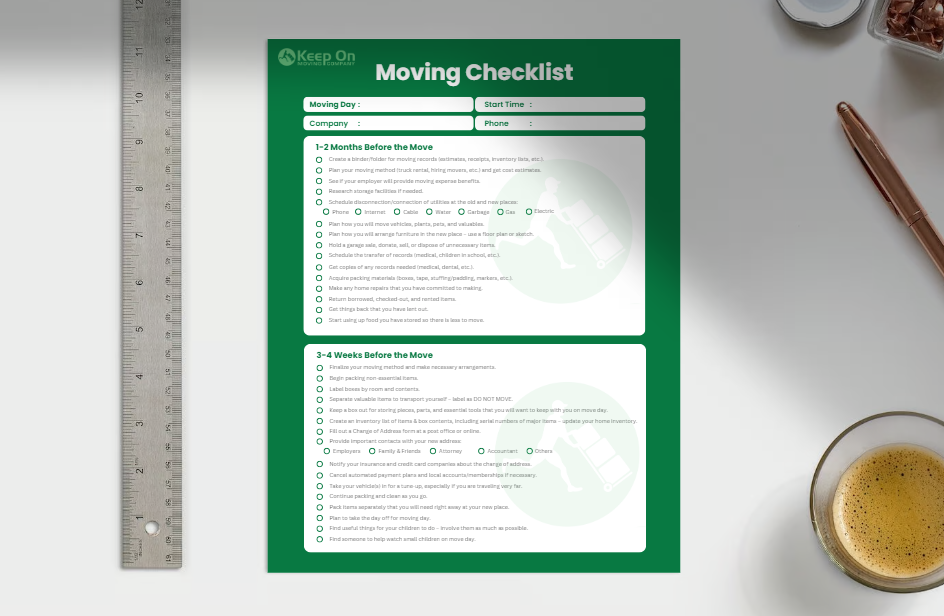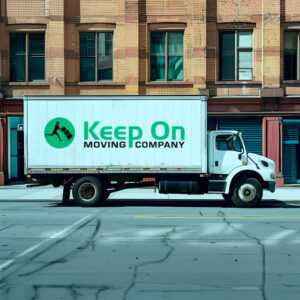Change is a constant in life, and for millions of Americans each year, that change involves a change in location. Whether you’re moving across town or across the country, from a small apartment to a spacious house, relocating can be a stressful and all-consuming experience. However, with the right planning and tools, it doesn’t have to be.
One to Two Months Before Moving
Schedule Cancellations of Utilities and Services
Contact your utility providers to schedule the shutdown of services, ensuring you provide them with your new address for billing purposes. Consider the following service providers:
- Water and sewage treatment
- Internet and cable services
- Electricity
- Natural gas/propane
- Trash and recycling pickup
- Homeowners or renters insurance
- Gardeners, landscapers, snowblowers
- Gym membership
Give Notice
If you’re a renter, inform your landlord of your intent to move. The notice period typically ranges from 30 to 90 days, depending on state laws and your rental agreement. Homeowners may also need to notify a homeowners or neighborhood association, if applicable.
Start Culling Your Possessions
Begin decluttering your home approximately eight weeks before the move. Sort items into three categories: keep, give away, and recycle/trash. This process will help you reduce the number of items to move and simplify your packing.
Evaluate Bulky Furniture
Consider whether it’s worth moving large and heavy furniture items. Moving costs are often based on weight or size, so selling or donating items that you don’t plan to use at your new place can save you money.
Choose a Moving Company
If you’re hiring movers, start your search at least two months before your move to secure the best price. Reputation and experience are crucial when selecting a moving company. Seek recommendations from friends, read online reviews, and check listings on the Better Business Bureau. Request on-site estimates for large moves and compare quotes from different companies. Ensure the company is licensed with a U.S. Department of Transportation (USDOT) number for interstate moves and can provide a certificate of insurance (COI) if required by your rental building.
Consider Portable Containers
Explore the option of renting portable containers from companies like PODS. You can load them yourself over several weeks and store your belongings if you won’t be moving them immediately to your new place.
Parking Permits
Research whether you need parking permits for moving day, especially in downtown and metropolitan areas. Different cities have varying rules and terminology for permits, so make sure you understand the regulations for both your old and new locations.
Moving Week
Confirm Your Move
Contact your chosen movers or rental companies to confirm your moving arrangements.
Notify Neighbors
If your move may disrupt your neighbors, give them advance notice to plan accordingly.
Appointments for Utilities and Internet
Confirm appointments for cable service, internet installation, and new utility providers to avoid any service interruptions at your new home.
Clean the Old Place
Consider hiring professionals for deep cleaning to improve the chances of receiving a rental deposit refund. Repair minor damages, spackle nail holes, and use sturdy contractor clean-up bags for trash removal.
Pack Personal Essentials
Pack essential items separately in a suitcase for easy access during the move. This will include clothes, medications, toiletries, and other daily necessities.
The Day Before Moving
Remind Neighbors
Notify neighbors if your move may impact their access to driveways or parking spaces.
Prepare Cash for Tipping
While tipping is not obligatory, it is a kind gesture for hardworking professional movers. Plan to tip approximately 15% to 20% of the total moving cost in cash. Individual tips for each mover are appreciated and ensure everyone receives their intended share.
Treat Yourself
Enjoy a meal at your favorite local restaurant with friends or indulge in a small celebration to ease the pre-move stress.
Try to Relax
Moving can be a significant source of stress. Take time to relax with a quiet walk or meditation to calm your mind before the big day.
Moving Day
Supervise the Move
Whether you’ve hired professionals or enlisted the help of friends, you’re the project manager for a safe move. Conduct a final walkthrough of your old home and inspect the moving truck to ensure nothing is left behind and that your belongings are handled carefully.
Provide Snacks and Drinks
Keep your energy up with healthy snacks during the move and consider offering refreshments to your movers as a thoughtful gesture.
Secure Your Old Home
Before leaving your old home, ensure all windows are closed, lights are turned off, and doors are locked.
Return Keys
Don’t forget to return keys to your landlord or coordinate with your real estate agent for handover to new owners/realtors.
With this comprehensive moving checklist from Keep On Moving Company, you can tackle every aspect of your move with confidence. Whether you’re relocating locally or embarking on a long-distance journey, our expert advice will help you navigate the process smoothly. Safe travels and enjoy your new home!






